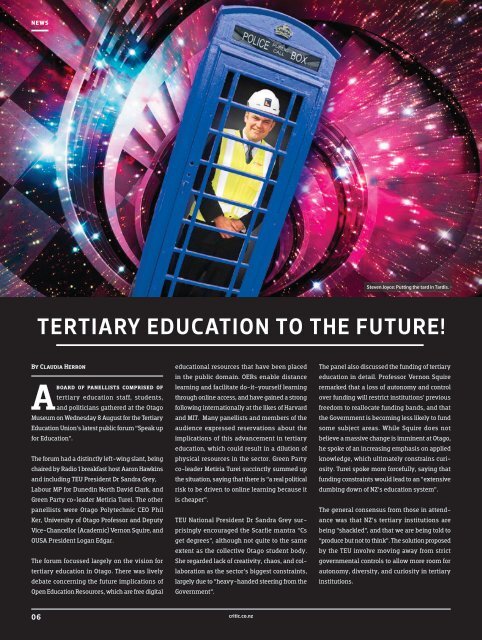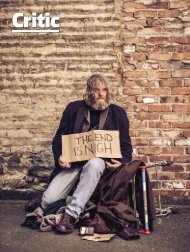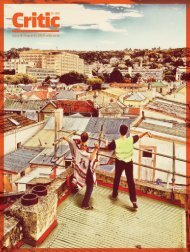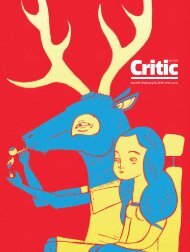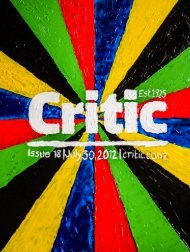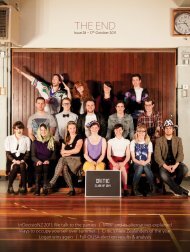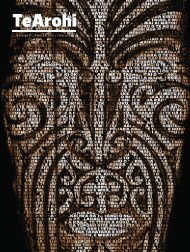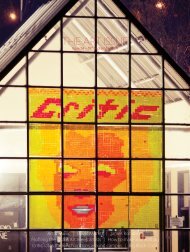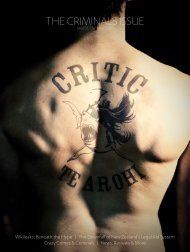Issue 20 | August 13,2012 | critic.co.nz
Issue 20 | August 13,2012 | critic.co.nz
Issue 20 | August 13,2012 | critic.co.nz
You also want an ePaper? Increase the reach of your titles
YUMPU automatically turns print PDFs into web optimized ePapers that Google loves.
NEWs<br />
By Claudia Herron<br />
A<br />
board of panellists <strong>co</strong>mprised of<br />
tertiary education staff, students,<br />
and politicians gathered at the Otago<br />
Museum on Wednesday 8 <strong>August</strong> for the Tertiary<br />
Education Union’s latest public forum “Speak up<br />
for Education”.<br />
The forum had a distinctly left-wing slant, being<br />
chaired by Radio 1 breakfast host Aaron Hawkins<br />
and including TEU President Dr Sandra Grey,<br />
Labour MP for Dunedin North David Clark, and<br />
Green Party <strong>co</strong>-leader Metiria Turei. The other<br />
panellists were Otago Polytechnic CEO Phil<br />
Ker, University of Otago Professor and Deputy<br />
Vice-Chancellor (Academic) Vernon Squire, and<br />
OUSA President Logan Edgar.<br />
The forum focussed largely on the vision for<br />
tertiary education in Otago. There was lively<br />
debate <strong>co</strong>ncerning the future implications of<br />
Open Education Resources, which are free digital<br />
06<br />
TERTIARY EDUCATION TO THE FUTURE!<br />
educational resources that have been placed<br />
in the public domain. OERs enable distance<br />
learning and facilitate do-it-yourself learning<br />
through online access, and have gained a strong<br />
following internationally at the likes of Harvard<br />
and MIT. Many panellists and members of the<br />
audience expressed reservations about the<br />
implications of this advancement in tertiary<br />
education, which <strong>co</strong>uld result in a dilution of<br />
physical resources in the sector. Green Party<br />
<strong>co</strong>-leader Metiria Turei succinctly summed up<br />
the situation, saying that there is “a real political<br />
risk to be driven to online learning because it<br />
is cheaper”.<br />
TEU National President Dr Sandra Grey sur-<br />
prisingly en<strong>co</strong>uraged the Scarfie mantra “Cs<br />
get degrees”, although not quite to the same<br />
extent as the <strong>co</strong>llective Otago student body.<br />
She regarded lack of creativity, chaos, and <strong>co</strong>llaboration<br />
as the sector’s biggest <strong>co</strong>nstraints,<br />
largely due to “heavy-handed steering from the<br />
Government”.<br />
<strong>critic</strong>.<strong>co</strong>.<strong>nz</strong><br />
Steven Joyce: Putting the tard in Tardis.<br />
The panel also discussed the funding of tertiary<br />
education in detail. Professor Vernon Squire<br />
remarked that a loss of autonomy and <strong>co</strong>ntrol<br />
over funding will restrict institutions’ previous<br />
freedom to reallocate funding bands, and that<br />
the Government is be<strong>co</strong>ming less likely to fund<br />
some subject areas. While Squire does not<br />
believe a massive change is imminent at Otago,<br />
he spoke of an increasing emphasis on applied<br />
knowledge, which ultimately <strong>co</strong>nstrains curiosity.<br />
Turei spoke more forcefully, saying that<br />
funding <strong>co</strong>nstraints would lead to an “extensive<br />
dumbing down of NZ’s education system”.<br />
The general <strong>co</strong>nsensus from those in attend-<br />
ance was that NZ’s tertiary institutions are<br />
being “shackled”, and that we are being told to<br />
“produce but not to think”. The solution proposed<br />
by the TEU involve moving away from strict<br />
governmental <strong>co</strong>ntrols to allow more room for<br />
autonomy, diversity, and curiosity in tertiary<br />
institutions.


